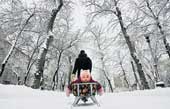 |
| Mom’s the word: Mothers should warn their children about the bad times they may have to face sometimes |
I recently had a chance to speak to a cafeteria full of high school girls at the Lincoln School in Providence, Rhode Island. Each had been asked to invite a woman she admires, and most brought their moms, making it the first time I spoke to an audience of mothers and daughters. As I talked about life and work, and how some days the balancing act doesn’t go very well, the mothers nodded knowingly while the students were polite, but looked confused.
After my talk at the Lincoln School, mothers came up to tell me that this was the first time they had ever thought to talk to their girls about the challenges of combining work and parenting. Do any of us think to have those talks?
When we talk to our children about sex, about alcohol and drugs, or about the dangers of the Internet, we give them limitations and warnings. But when it comes to the subject of work, we tell them that they can be whatever they aspire to be; that they should aim high, work hard and dream big. What we rarely do is tell them how hard some days are. Or that along the road, they might have to compromise, or detour, or backtrack. To warn them would be to discourage them. Or so our thinking goes.
The morning after my speech I met with smaller groups of students in workshops, where I heard that many of them had learned quite a lot about their mothers during their rides home the night before. One girl heard for the first time how her mother was still wistful over her choice not to go to medical school after she’d learned she was pregnant. Another mother described a recent itch to get back into the work force after a few years of being away, and the unfamiliar frustration of being seen by employers as too old.
How many of you, I asked, were regularly told by your mothers that you can be whatever you want to be? Every girl in the room raised her hand. Then I asked: “How many of your mothers have worked full-time for most of your lives?” In each of two workshops, with about 25 girls each, only one or two hands went up. The message: Do as I say, not as I have been able to do.
We are telling our children half the truth. We are doing this to both boys and girls — as it happens, the Lincoln School is girls only — and we are leaving them ill-prepared.
Of course we want to tell them that they can achieve all they can envision. But we also need to tell them that those visions may change colour and scope along the way. Of course we want to tell them that hard work will pave their way. But we must also warn them that sometimes it won’t be enough, and that they will have to choose, because the whole of work and the whole of life rarely fit neatly into every working day.
There is the risk that this will discourage them, but the alternative, I think, is worse. Thinking that we could do it all, then crashing headlong into the wall of “but not at the same time” is part of the reason that so many women have left the work force in frustration in recent years.
Thinking that hard work will get them anywhere is what led so many to believe that re-entry would be much easier than it is proving to be. In her new book, The Feminine Mistake, Leslie Bennetts writes about the destructive assumption that women can leave their jobs without financial risk. Unprepared for the imperfections of the workplace and the “second shift” at home, they assume that their inability to balance is their failure. So they leave, trusting that their husbands will stay alive and faithful, and that the workplace will remain eager for their return.
Will an understanding that Mom regularly drops the ball give them permission to do so, too? Will frank talk about the bad days provide inoculation against them? Will eyes open to the faults of an inflexible workplace make them more likely to insist on change?
Maybe not. But as parents we must hope that there are more answers for them than there were for us, just as we had more than our mothers. And the only way to find those answers is to teach our children — early and often — how to ask the questions.










